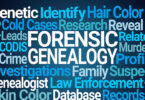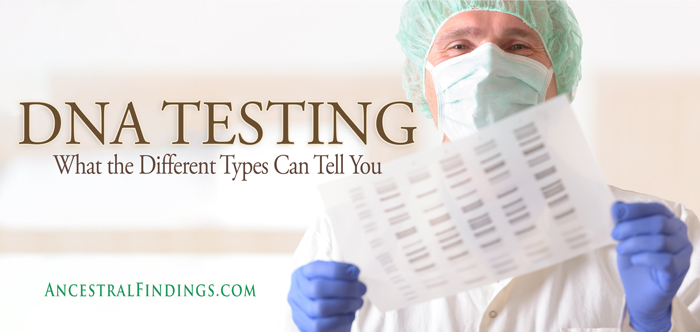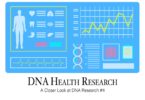I’ve started using DNA more and more to research my family history, and it is producing amazing results. Unlike documents and family stories, DNA cannot be recorded or remembered wrong, lied about, or accidentally get wrong information added to it from someone who doesn't know the real answer. DNA is the purest form of genealogy research, and it will never steer you astray. It answers questions, breaks down brick walls, and confirms truths. DNA is one of your best friends when it comes to genealogy, and you should use it to your advantage. This means being on as many DNA websites as possible, communicating with the genetic matches you meet there, and confirming that the DNA information and your research paper trail align with each other. With DNA added to your box of genealogy tools, you will always have the peace of mind that comes with a sure knowledge that you are putting the correct ancestors on your family tree.
The three best DNA websites out there right now are Ancestry DNA, 23andMe, and FamilyTreeDNA. I would recommend you get your DNA tested with all of them. If you can’t do them all, then do one (my personal recommendation is 23andMe, which I’ll get to in a moment), then download your raw genetic data from the site and upload it to the other two sites. FamilyTreeDNA just started allowing you to upload your raw genetic data from other companies for free, and it is a really wonderful tool.
There are also individual DNA study projects for certain families. Have a look around the internet for them. A Google search should give you what you need. Request to join as many surname genealogy studies as you qualify for, and input your DNA information manually. If anyone joins who is a close match to you with their DNA, you can look for your common ancestor together, learn how you fit in with the other people in the project, and maybe create a new branch to an already large family tree going back to the same ancient couple.
AncestryDNA is probably the most popular DNA testing site out there right now because it has the cheapest product and the best-known brand name. When you get your DNA tested with them, you discover what ethnicities makeup what percentage of your ancestry, and also get a list of other people who have tested there who are close genetic matches to you. You can contact these people and share family trees, if you have yours online (particularly on Ancestry.com), and discover your common ancestor or ancestors.
However, in my experience, there is not much actual communicating going on between genetic matches on AncestryDNA. The ethnicity part is interesting, and you can learn a great deal about your genetic matches and how they relate to you if they have an online family tree connected to their account. But, I haven’t gotten many requests for information from other members there and only a handful of responses to requests I’ve made. I think because Ancestry allows people to put their online family trees on their DNA profiles, it makes actual communication seem not as necessary to other users.
Then, there is 23andme. It also shows you the percentages of the various ethnicities that make up your ancestry going back approximately five hundred years. It is a little more detailed with the ethnicity breakdown than AncestryDNA is, too, which makes it more interesting. You used to be able to get a host of health information there, too, but issues with the FDA made the company stop being able to offer that information for a while. It is back to offering some health information and is the only DNA company that does, but it is not nearly as wide of an offering as it used to be. Still, what is there is fascinating. If you tested with them before 2013 and got the full slate of health information, you’re grandfathered in and still have access to it.
You also get your close genetic matches, including your predicted relationship to them. It is easy to test the accuracy of the relationship predictor by getting someone whose relationship to you that you know for sure to test. I’ve done this, and it is remarkably accurate. The only thing it ever got wrong was telling me a half-aunt was a likely second cousin. This is because a half-aunt and a second cousin share about the same percentage of DNA with you, the tester, and the company goes with what they consider the most likely relationship.
I’ve found the response rate from matches you contact on 23andme to be about 25%. It’s not great, but it is better than the response rate you get on AncestryDNA. I’ve had some excellent conversations with DNA matches here, and some mysteries were solved or at least had more light shed on them. There is a feature on 23andMe to upload family tree information, but most don’t, and those who do only upload a little. This is because it is not compatible with any other family tree software, so you have to enter everything manually.
The other company, FamilyTreeDNA, is one that just offers genetic matches, as well as your Haplogroup. However, I’ve found the response rate from matches on here to be incredible. I’d say around 80% of matches I’ve contacted have gotten back to me. What’s better is that the site allows you to see and use the match’s email address, so you can email them directly, and not just through the website. This probably accounts for the better match response, because people check their email more than they check DNA websites. The site is also compatible with some common family tree programs, so it is not unusual to find matches with extensive, searchable family trees, making it easy to confirm relationships, even with distant common ancestors. The people here seem to be the most genuinely interested in genealogy, too. FamilyTreeDNA was one of the first companies to offer commercial DNA testing for genealogical purposes, so a lot of the people on here are early DNA adopters. They’re interested in it. I’ve had back and forth conversations with several that go for a few days, stop for a while, then continue when one or the other of us has more information to share.
If you are serious about building an accurate family tree, breaking down those brick walls, and even discovering old family heirlooms and photos that went to long-forgotten branches, you definitely want to get your DNA tested at one or more of these websites, and start communicating with your matches. It’s an adventure you’ll always be glad you began. It is probably the best thing you can do for your genealogy research and family tree building.




